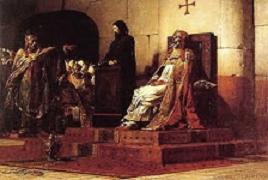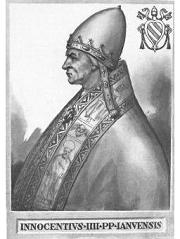Here are eleven of those stories, revealing some of those men who claim to be the vicars of God in Earth in spite of their power-hungry, sexually immoral, and ungodly characters during their term as head of the universal Church.
1. Pope Stephen VI: had his predecessor exhumed, tried, de-fingered, and thrown to the river
Stephen VI was Pope from 896 to 897. Fueled by his anger with Pope Formosus, his predecessor, he exhumed Formosus’s rotting corpse and put “him” on trial, in the so-called “Cadaver Synod” in January, 897.
With the corpse propped up on a throne, a deacon was appointed to answer for the deceased pontiff, who was condemned for performing the functions of a bishop when he had been deposed and for receiving the pontificate while he was the bishop of Porto, among other revived charges that had been leveled against Formosus in the strife during the pontificate of John VIII.
The corpse was found guilty, stripped of its sacred vestments, deprived of three fingers of its right hand (the blessing fingers), clad in the garb of a layman, and quickly buried; it was then re-exhumed and thrown in the Tiber. All ordinations performed by Formosus were annulled.
The trial excited a tumult. Though the instigators of the deed may actually have been Formosus’ enemies of the House of Spoleto (notably Guy IV of Spoleto), who had recovered their authority in Rome at the beginning of 897 by renouncing their broader claims in central Italy, the scandal ended in Stephen’s imprisonment and his death by strangling that summer. Talk about bad Popes.
2. Pope Benedict IX: the Pope who sold the papacy
Benedict IX was Pope from 1032 to 1044, again in 1045, and finally from 1047 to 1048, the only man to have served as Pope for three discontinuous periods, and one of the most controversial Popes of all time. Benedict gave up his papacy for the first time in exchange for a large sum of money in 1044. He returned in 1045 to depose his replacement and reigned for one month, after which he left again, possibly to marry, and sold the papacy for a second time, to his Godfather (possibly for over 650 kg /1450 lb of gold). Two years later, Benedict retook Rome and reigned for an additional one year, until 1048. Poppo of Brixen (later to become Pope Damascus II) eventually forced him out of Rome. Benedict’s place and date of death are unknown, but some speculate that he made further attempts to regain the Papal Throne. St. Peter Damian described him as “feasting on immorality” and “a demon from hell in the disguise of a priest” in the Liber Gomorrhianus, a treatise on papal corruption and sex that accused Benedict IX of routine homosexuality and bestiality.
3. Pope Sergius III: ordered the murder of another pope and started the “pornocracy”
Sergius III was Pope from 897 to 911, and has been the only pope known to have ordered the murder of another pope and the only known to have fathered an illegitimate son who later became pope; his pontificate has been described as “dismal and disgraceful.” The pontificate of Sergius III was remarkable for the rise of what papal historians call a “pornocracy,” or rule of the harlots, a reversal of the natural order as they saw it, according to Liber pontificalis and a later chronicler who was also biased against Sergius III. This “pornocracy” was an age with women in power: Theodora, whom Liutprand characterized as a “shameless whore… [who] exercised power on the Roman citizenry like a man” and her daughter Marozia, the mother of Pope John XI (931–935) and reputed to be the mistress of Sergius III
4. Pope John XII: raped female pilgrims and invoked pagan gods
John XII was Pope from 955 to 964. On 963, Holy Roman Emperor Otto I summoned a council, levelling charges that John had ordained a deacon in a stable, consecrated a 10-year-old boy as bishop of Todi, converted the
Lateran Palace into a brothel, raped female pilgrims in St. Peter’s, stolen church offerings, drank toasts to the devil, and invoked the aid of Jove, Venus, and other pagan gods when playing dice. He was deposed, but returned as pope when Otto left Rome, maiming and mutilating all who had opposed him. On 964, he was apparently beaten by the husband of a woman with which he was having an affair, dying three days later without receiving confession or the sacraments.
5. Pope Leo X: sold indulgences, killed cardinals
Leo X was Pope from 1513 to his death in 1521. He is known primarily for the sale ofindulgences to reconstruct St. Peter’s Basilica and his challenging of Martin Luther’s 95 theses.
According to Alexandre Dumas, “under his pontificate, Christianity assumed
a pagan character, which, passing from art into manners, gives to this epoch a strange complexion. Crimes for the moment disappeared, to give place to vices; but to charming vices, vices in good taste, such as those indulged in by Alcibiades and sung by Catullus.” When he became Pope, Leo X is reported to have said to his brother Giuliano: “Since God has given us the papacy, let us enjoy it.”
His extravagance offended not only people like Martin Luther, but also some cardinals, who, led by Alfonso Petrucci of Siena, plotted an assassination attempt. Eventually, Pope Leo found out who these people were, and had them followed. The conspirators died of “food poisoning.” Some people argue that Leo X and his followers simply concocted the assassination charges in a moneymaking scheme to collect fines from the various wealthy cardinals Leo X detested.
6. Pope Alexander VI: nepotism, orgies and the rise of the Borgia family
Alexander VI was Pope from 1492 to 1503. He is the most controversial of the secular popes of the Renaissance, and his surname (Italianized as Borgia) became a byword for the debased standards of the papacy of that era. Originally Cardinal Borgia from Spain, Pope Alexander’s claims to fame were taking over much of Italy by force with the help of his son Cesare (yes, his son), a racy relationship with his daughter Lucrezia
(some say her son was his), and his affinity for throwing large parties, bordering on orgies, that usually culminated with little naked boys jumping out of large cakes.
7, Pope Innocent IV: introduced torture on the Inquisition
Innocent IV was Pope from 1243 to 1254. Certainly the Inquisition represents the darkest of Roman Church history, and it was Innocent IV who approved the use of torture to extract confessions of heresy. He aggressively applied the principle that “the end justifies the means.” It is shocking to learn about the deranged instruments of torture that were used on so many innocent people. One of the most famous people to suffer at the hands of Roman inquisitors was Galileo. The church condemned Galileo for claiming that the earth revolved around the sun.
8. Pope Urban VI: complained he did not hear enough screaming when his Cardinals were tortured
Urban VI was Pope from 1378 to 1389. He was the first Pope of the Western Schism (which ultimately lead to three people claiming the Papal throne at the same time). Once elected, he was prone to outbursts of rage. The cardinals who elected him decided that they had made the wrong decision and they elected a new Pope in his place, so he took the name of Clement VII and started a second Papal court in Avignon, France. Later he would launch a program of violence against those he thought to have been conspiring against him, imprisoning people at will and mistreating them brutally. Later historians have considered seriously that he might have been insane.
The second election threw the Church into turmoil. There had been antipopes, rival claimants to the papacy, before, but most of them had been appointed by various rival factions; in this case, the legitimate leaders of the Church themselves had created both popes. The conflict quickly escalated from a church problem to a diplomatic crisis that divided Europe. Secular leaders had to choose which pope they would recognize. The schism was repaired forty years later when all three of the (then) reigning Popes abdicated together and a successor elected in the person of Pope Martin V.
9. Pope John XV: split the church’s finances among his relatives
Pope John XV
John XV was Pope from 985 to 996. The Pope’s venality and nepotism had made him very unpopular with the citizens, as he split the church’s finances among his relatives and was described as “covetous of filthy lucre and corrupt in all his acts.”
10. Pope Clement VII: his power-politicking with France, Spain, and Germany got Rome sacked
Clement VII was Pope from 1523 to 1534. A member of the powerful Medici family, Clement VII possessed great political and diplomatic skills – but he lacked the understanding of the age necessary to cope with the political and religious changes he faced. His relationship with Emperor Charles V was so bad that, in May 1527, Charles invaded Italy and sacked Rome.
Imprisoned, Clement was forced into a humiliating compromise which forced him to give up a great deal of secular and religious power. Eventually, Clement became ill and never recovered. He died on September 25, 1534, hated by the people of Rome, who never forgave him for the destruction of 1527.
11. Pope Gregory VII: one who claim boastful attributions to himself.
The Dictates of Hildebrand (a set of principles which had been initiated by Gregory decades before he ascended the throne as Gregory VII) states;
9. That of the pope alone all princes shall kiss the feet.
11. That this is the only name in the world.
19. That he himself may be judged by no one.
22. That the Roman church has never erred; nor will it err to all eternity, the Scripture bearing witness.
















